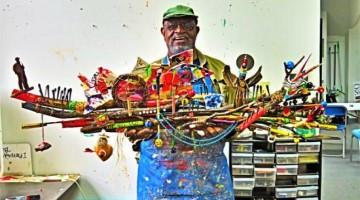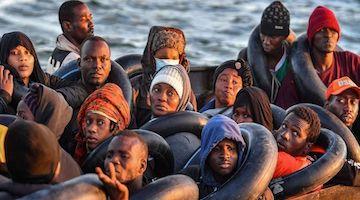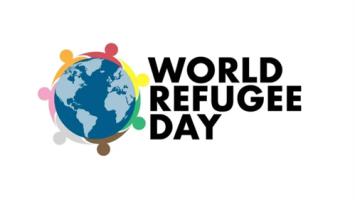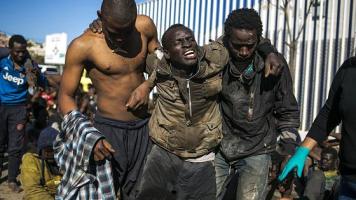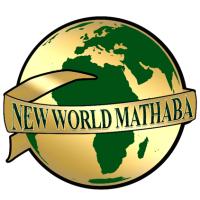In this series, we ask acclaimed authors to answer five questions about their book. This week’s featured author is Boukary Sawadogo. Sawadogo is Associate Professor of Cinema Studies and Black Studies at City College–City University of New York. His book is Africans in Harlem: An Untold New York Story.
Roberto Sirvent: How can your book help BAR readers understand the current political and social climate?
Boukary Sawadogo: The book addresses migration through the questions of belonging and integration, the growing number of US-born minorities, and the tightening of immigration laws globally which are all themes that cut across ethnic and national divides. Cities around the world are diversifying, neighborhoods are being transformed. There is a need to reflect on segregation in the access to quality public services in cities and the changing demographics in the urban landscape.
In addition, extremist violence is an increasingly significant factor of dislocation within Africa and globally. Today, internal displacement in the Sahel in West Africa (Mali, Burkina Faso, Niger) due to jihadist attacks has seen agro-pastoral villagers flee their homes for big cities and countries along the coast such as Côte d’Ivoire, Ghana, Benin, and Guinea. The resulting fast-moving urbanization will in turn either cause cities to implode because of the infrastructure’s inability to accommodate these mass arrivals or generate a mass movement toward the global North. Erecting physical barriers to prevent land border crossings, how sophisticated and inhuman they might be as a way of deterrence, will not stop those who have lost everything except a hope for a better future beyond their immediate living environment.
Also, climate migration is an urgent issue of contemporary relevance. Effects of climate change—less rainfall or flooding in traditionally arid zones—are already a lived experience for the vast Sahara, specifically in the West African Sahelian region. The drought of the 1970s has left an indelible scar in the collective memory of the devastating impact of climate change on their livelihoods. The drought had brought tremendous suffering to humans and animals across the Sahel region, causing migration within and outside the continent.
What do you hope activists and community organizers will take away from reading your book?
What is the African presence and trajectory in the world today? There are many answers to this interrogation. One of my answers is to look at African immigrant communities in the global north, and also the exchanges and encounters between Africans and the Black diaspora. The very concept of the African diaspora is changing, as it also showcases a new profile as an outgrowth of globalization and economic development driven by creative talents. African diaspora historically refers to communities around the world whose ancestors were forcefully removed from the continent. But the notion of “diaspora” describes not only a dispersal of human beings but also the permanent connections and ties to the homeland. Also, the shifting meaning of diaspora is evident on the continent, as the African Union now includes a fifth and virtual region covering the African diaspora from the initial four geographic regions encompassing the pan-African political and economic organization.
Empowerment of immigrant communities of working class ethnic and racial minorities. There is a wide discrepancy between African immigrants’ contribution to the national economy and the limited political leverage wielded by African immigrants to promote and defend their interests in the United States. For instance, the New American Economy, a coalition of Republican, Democratic, and independent mayors and business leaders advocating for immigration reforms to help the American economy, published a twenty-two-page report in January 2018 titled “Power of the Purse: How Sub-Saharan Africans Contribute to the US Economy,” which outlined the significant economic contributions of Africans to state economies. The report states that in 2015 African immigrants earned $55.1 billion, of which $4.7 billion went to state and local taxes, and $10.1 billion went to federal taxes, leaving them with $40.3 billion in spending power.
We know readers will learn a lot from your book, but what do you hope readers will un-learn? In other words, is there a particular ideology you’re hoping to dismantle?
First, we have sadly entered an era in which fear has taken over scientific evidence in rational policymaking. The anti-migration rhetoric and tightening of immigration laws disproportionately impacting people of the global south are generally premised on the unsubstantiated claim that migrants are profiteers while studies repeatedly show how immigrants contribute to the economic and cultural development of host countries. For instance, the COVID-19 pandemic has brought attention the important role of essential workers—made mostly of immigrants in low-paid service jobs—who kept New York City running during the stay-at-home order in 2020.
Second, I would like to complexify the narrative and representation of Harlem through the story of African immigrants in Harlem's most recent renaissance. From Little Senegal, along 116th Street between Lenox Avenue and Frederick Douglass Boulevard, to the African street vendors on 125th Street, to African stores, restaurants, and businesses throughout the neighborhood, the African presence in Harlem has never been more active and visible than it is today. African immigrants have significantly contributed to Harlem's most recent renaissance after decades of neglect, crack epidemic, and gang violence. The presence and influence of African-born immigrants in Harlem should be situated in the larger context of historical and contemporary exchanges and encounters between Africa and the diaspora.
Which intellectuals and/or intellectual movements most inspire your work?
I drew on conversations about universal(ism) and decoloniality from the works of Senegalese philosopher Souleymane Bachir Diagne on translation, and writings by the Martinican philosopher and literary theorist Édouard Glissant who offers a critical lens for understanding creolization and identity formation in the diaspora. The thinkers and writers Felwine Sarr, Achille Mbembe, Ngugi wa Thiong’o, and Wole Soyinka have provided inspiration on thinking the world from Africa or rethinking the continent from African perspectives.
As for intellectual movements, there are the encounters and exchanges between the Harlem Renaissance and the Negritude literary movement in the first half of the twentieth century, laying the groundwork for liberation movements in French colonies in Africa and the Caribbean. Then, solidarity movements from 1960s through the early 1990s have brought together Africa and the diaspora through exchange and support networks in freedom and liberation struggles against racism, discrimination, and colonialism. There was convergence between civil rights movement in the USA, and political independence and anti-apartheid movements in Africa. The anti-apartheid mobilized activists, student organizations, and religious organizations in the USA, of which New York has been one of its most active sites with the Riverside Church and the Patrice Lumumba Coalition in Harlem. These reasons, along with perceived affinity with Blackness, have been significant factors for the first African immigrants settling in Harlem en masse in the late 1980s and early 1990s.
Which two books published in the last five years would you recommend to BAR readers? How do you envision engaging these titles in your future work?
I am writing to give voice and presence to African immigrants both in the public discourse and larger narrative of the United States, specifically from African(-born) perspectives. In this respect, I currently do not have recommended titles of nonfiction books that are geared toward the general readership, which is what my current book Africans in Harlem: An Untold New York Story does, as is also the case with my next book on which I am already fully at work.
Roberto Sirvent is editor of the Black Agenda Report Book Forum.

